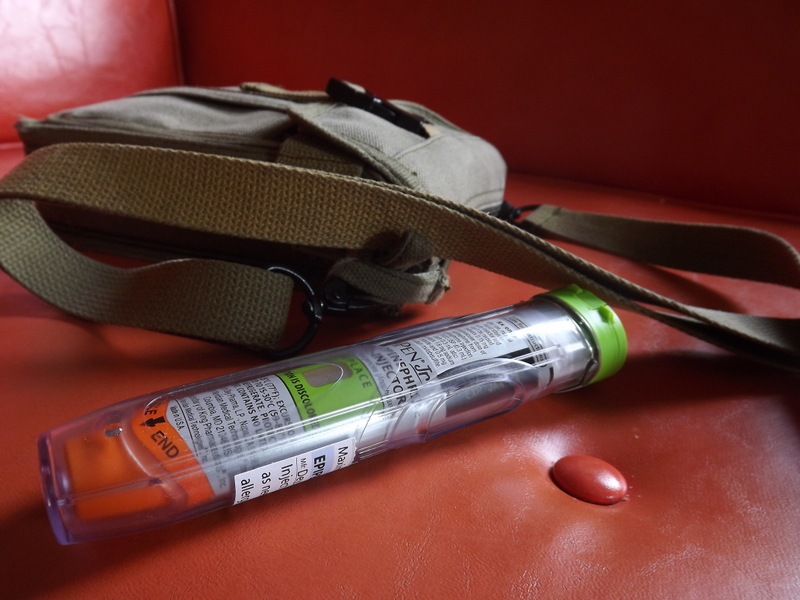
Photo Credit: Vu Nguyen, Creative Commons 2.0
On Wednesday, September 21, Mylan NV Chief Executive, Heather Bresch, attended a hearing regarding her company’s large price increase of the emergency allergy medication device EpiPen.
The House Committee on Oversight and Government Reform raised concern over the 500 percent increase of price of EpiPen since Mylan bought the rights to sell and market the device in 2007. Since Mylan’s purchase of EpiPen, prices have risen from $100 for a two-pack of EpiPens to $608 for the same package deal. This inflation of the life-saving medication has impacted many families who can no longer afford the device. This claim is reinforced by a study from IMS Health, which reports more than 3.6 million EpiPen prescriptions were filled last year.
Bresch defended the price increase, noting the intricate process of marketing and selling pharmaceuticals to patients and physicians contributed to the increase of EpiPen prices. Bresch claimed that after rebates, marketing and manufacturing fees, that the company received a net total of $274 for a two-pack sale of EpiPens and only claimed approximately $100 in actual profit for such a sale. However, US Representative and Committee Chairman Elijah Cummings stated that the documents that were given by Mylan show that the company only spent about $100 million in marketing last year.
Legislators who attended the hearing remained skeptical throughout the debate. Several lawmakers noted Bresch’s rapid increase in annual salary, which has risen from $2.5 million to $18 million. According to Bloomberg This increase in salary has made Bresch the 25th-best paid executive in the healthcare industry. Furthermore, the Committee cited Mylan’s profits based off of EpiPen sales in 2015 which accounted for $1 billion of the company’s $9.45 billion returns and about 20 percent of the company’s total profit.
A study conducted by the consumer watchdog agency Public Citizen, shows the differences in EpiPen prices around the world, and that American Epipen prices are at least three times higher than any other country. This study provided fodder for accusations by the Committee that Mylan has taken advantage of America’s healthcare system. These prices include:
- $69 in the United Kingdom
- $98.68 in France
- $181.81 in Canada
- $210.21 in Germany
Claims of Mylan’s corrupt business strategy were reinforced by the Committee when they noted that Mylan holds 90 percent of the market for emergency allergy medication and the classification of EpiPen as a generic medication in Medicaid’s rebate program. Because EpiPen is classified as generic, it is allowed to pay only 13 percent in rebates instead of the 23 percent paid by branded medications.
Bresch stated in the hearing that Mylan expects to start manufacturing a alternate EpiPen device that will be sold for $300 in a two-pack, and that the company expects to extend the shelf life of EpiPens from 18 month to two years. Bresch also noted that Mylan provided assistance programs to patients, and that many schools are sold EpiPens at a discounted price or donated EpiPens.
Tammy Duckworth rebutted the argument by arguing that the contracts that many schools sign to acquire EpiPens are used to reinforce Mylan’s monopoly in the industry. Duckworth presented a contract to the Committee that schools would have to sign in order to receive discounts or donations of EpiPens, but reported that these contracts required schools to only purchase such medications from Mylan exclusively.
“You’re so concerned about these kids that you limit the schools’ ability to buy the pens from anyone else,” stated Duckworth.
Tensions Rise at the Hearing
Discussions were heated during the debate. Such tensions were evident, as Representative John J. Duncan Jr. put it, “I’m a very conservative, pro-business Republican, but I’m really sickened by what I… heard here today.”
Rep. Cummings voiced his displeasure as well, stating “Today, we will hold yet another hearing where the industry will take these punches, but then go right ahead and keep raising their prices. They will fly back to their mansions in their private jets and laugh all the way to the bank while constituents suffer.”
Bresch affirms that the lashback of the price increase wasn’t her company’s intention, stating “Looking back, I wish we had better anticipated the magnitude and acceleration of the rising financial issues for a growing minority of patients” who had to pay the full listed price of an EpiPen kit. “We never intended this.”
Representative Jason Chaffetz replied to her statement, saying “You never anticipated this? You raised the price, what did you think was going to happen?”
Chaffetz reaffirmed his distaste in Mylan’s business strategies by holding an EpiPen during the hearing and saying, “the actual [medication] that’s in here that you need costs about a dollar.”
The States Take Action
Cummings concluded the hearing by requesting that Mylan provide documents that detail EpiPen pricing, manufacturing and marketing costs, lobbying, and other business strategies taken by Mylan within ten days for review.
Individual states have also initiated investigations to Mylan’s business practices. These investigations include many attorney generals looking into possible Medicaid fraud and requests for internal documents regarding EpiPen pricing. One such example is New York attorney general Eric Schneiderman is currently investigating antitrust issues regarding the contracts issued to schools by Mylan.
Meanwhile, the Food and Drug Administration, which has not classified EpiPen as a generic medication, is attempting to help boost the availability of alternative emergency allergy medications with other companies.



Leave a Comment